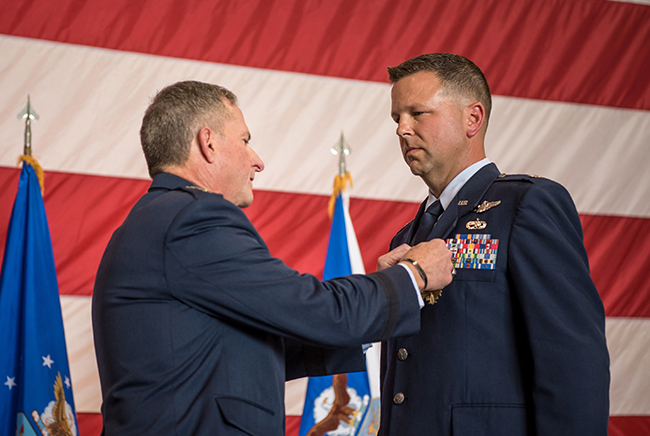
Lt. Col. John "J.T." Hourigan (right), a pilot for the 123rd Airlift Wing, is pinned with the Distinguished Flying Cross by Air Force Chief of Staff Gen. David Goldfein during a ceremony at the Kentucky Air National Guard Base in Louisville, Ky., on Aug. 10, 2019. Air National Guard photo by SSgt. Joshua Horton.
A Kentucky Air National Guard pilot on Aug. 10 received the Distinguished Flying Cross for averting disaster when his C-130 began a potentially fatal descent in 2016.
Air Force Chief of Staff Gen. David Goldfein presented the award to Lt. Col. John Hourigan, a Hercules pilot with the 123rd Airlift Wing of the Kentucky Air National Guard, during a ceremony in Louisville, Ky. Hourigan was a major at the time of the incident.
“This is a big day, and this is a big deal,” Goldfein said during the ceremony, according to an Aug. 11 release. “This is the Distinguished Flying Cross. We don’t hand many of these out.”
On July 15, 2016, Hourigan was flying the C-130 during a training flight near Owensboro, Ky., when the aircraft began to violently shake. At low altitude, the plane was vibrating “with such ferocity that crew members could not interpret the flight instruments or engine gauges, and were unable to communicate normally due to extreme noise,” according to the award citation.
As the plane rapidly lost altitude, the five-member crew feared the aircraft itself was breaking apart. Hourigan evaluated the situation, ruled out some possible causes, and prepared for a forced landing, according to the release. He noticed one engine’s throttle control was vibrating, and ordered that engine to be shut down about 300 feet above the ground.
He was then able to recover the aircraft and perform an emergency landing. On the ground, the crew discovered the engine that was shut down had suffered a catastrophic propeller failure.
“We’re really proud of J.T., and his team and his unit. For his steady hand under the worst conditions,” Goldfein said. “Because today we celebrate the safe return of an entire crew, so that you all can continue this wing’s incredibly important mission.”
In the aftermath of the incident, Hourigan helped with the investigation to determine the malfunction’s root cause, which led the Air Force to edit the C-130 operating manual. The issue reached the Joint Chiefs of Staff and resulted in depot- and unit-level maintenance orders, according to the release.
C-130s have been plagued with propeller problems for years, ultimately leading the Air Force to ground 60 aircraft earlier this year to replace propellers built before 1971. A Marine Corps KC-130T crash in Mississippi that killed 15 Marines in 2017 highlighted the issue as well. An investigation into that mishap found an Air Force depot failed to fix a corroded blade in 2011.
The service told Air Force Magazine on Aug. 8 all aircraft that required propeller inspections were looked at and returned to regular operations.